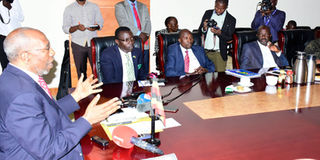Stop blocking Opposition party meetings, Rugunda tells police

Dialogue. Prime Minister Ruhakana Rugunda (left) meets members of the Interparty Platform for Dialogue at his office in Kampala yesterday. PHOTO BY ALEX ESAGALA
What you need to know:
The Forum for Democratic Change (FDC) Vice president in-charge of eastern region, Ms Proscovia Salaamu Musumba, insisted that the party will not attend the IPOD summit due next week without assurance that the latest resolutions have been implemented.
Kampala. Prime Minister Ruhakana Rugunda has directed the Uganda Police Force to stop imposing their own guidelines while implementing the Public Order Management Act (POMA).
Speaking to journalists after a meeting of the Interparty Platform for Dialogue (IPOD) at his office yesterday, Dr Rugunda said his directive was in regard to the agreement reached with leaders of Opposition parties. The meeting was closed to the media.
“It is the responsibility of security agencies, especially police, to ensure that we have a peaceful environment and hold meetings without clashes with the wananchi (citizens) who want to sit down and listen to their leaders without disturbances,” Dr Rugunda said.
The Opposition parties said the police have been misinterpreting POMA ever since it came into force by blocking their meetings and rallies instead of only receiving their notices to have such gatherings.
The Opposition actors argued that with police using POMA as an excuse for blocking their gatherings, the political ground is not levelled to enable them compete with the ruling National Resistance Movement.
Roadmap
Dr Rugunda said the police should implement POMA as it is by letting the political parties who notify them hold their meetings at both grassroots and national level so they are able to move with the Electoral Commission roadmap for the 2021 General Election.
The Prime Minister also said one of the resolutions in the IPOD meeting is the need to solve issues that arise in the political space through dialogue instead of violence as government considers amendments in POMA.
“The regulations (of POMA) are now going to be considered by government and will be taken to Parliament for approval,” he said.
Among the regulations that need to be amended include the power of receiving notification of meetings being a monopoly of the Inspector General of Police (IGP). The Opposition political actors demanded that such powers need to be decentralised so that such notifications can be sent to the District Police Commanders under whose jurisdiction a particular meeting will be held.
Section 5 of POMA provides that the organiser of a public gathering or meeting shall notify the IGP at least three days and not more than 15 days before the proposed date of the public gathering.
The Democratic Party (DP) Secretary General, Mr Gerald Siranda, said the parties were disappointed by the failure of the IGP, Mr Martins Okoth-Ochola, to attend the IPOD meeting where he was expected to explain where he gets powers to stop public gatherings despite prior and timely notification.
“We are disappointed because the IGP sent us the Director of Legal instead of his deputy. This is a sign that our dialogue might not yield results,’’ Mr Siranda said.
He added that police should show respect to the Prime Minister by adhering to the directive issued yesterday so that there is fair play in political mobilisation.
“The President has been moving up and down but we have never heard any news of police blocking his public gatherings. Why then the Opposition?” Mr Siranda asked.
FDC Position
The Forum for Democratic Change (FDC) Vice president in-charge of eastern region, Ms Proscovia Salaamu Musumba, insisted that the party will not attend the IPOD summit due next week without assurance that the latest resolutions have been implemented.
“As FDC we are not going to attend the summit. Let’s wait and see if police will respect the Prime Minister’s directive because we are tired of being harassed by security agencies,’’ she said.
FDC last year boycotted the IPOD summit at Speke Resort in Munyonyo, saying they would not meet with President Museveni.




